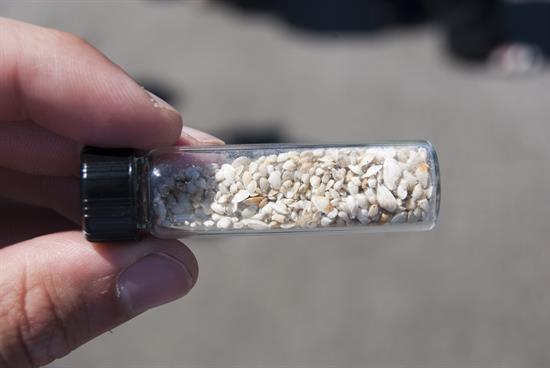Press Releases
Bonamici, Young, Pingree, Posey Introduce Bipartisan Bill to Address Health of Oceans and Estuaries
Washington,
February 14, 2019
Ocean acidification makes it more difficult for mussels, oysters, and clams, above, to full form their shells.
Bonamici, Young, Pingree, Posey Introduce Bipartisan Bill to Address Health of Oceans and Estuaries
WASHINGTON, DC [02/14/19] – Today Congresswoman Suzanne Bonamici (D-OR), Congressman Don Young (R-AK), Congresswoman Chellie Pingree (D-ME), and Congressman Bill Posey (R-FL) introduced the bipartisan Coastal and Ocean Acidification Stressors and Threats (COAST) Research Act. The COAST Research Act will strengthen federal investments in research and monitoring of changing ocean conditions. This research will help coastal communities better understand and cope with the effects of environmental stressors on our oceans and estuaries. About one third of the carbon dioxide in the atmosphere is absorbed into the ocean, causing water chemistry to change. Changing ocean conditions affect the more than 3 million blue economy jobs in the United States that rely on the ocean. These jobs contribute at least $352 billion to the economy every year. “Our oceans and estuaries face immediate threats from increasing carbon emissions,” said Congresswoman Suzanne Bonamici. “As oceans and estuaries absorb carbon dioxide produced by human activity, the waters become more acidic, destabilizing fisheries and threatening the future of coastal communities and ecosystems. The COAST Research Act will help strengthen research to better understand coastal and ocean acidification and give communities the tools they need to adapt and mitigate.” “Healthy oceans and waterways are essential to maintaining strong coastal communities and providing for a robust marine economy,” said Congressman Don Young. “Ocean acidification is an ongoing threat that must be tackled head-on if we are to ensure a bright economic future for Alaskans whose jobs depend on healthy oceans. Our legislation makes critical investments to assist scientists in their understanding of ocean acidification and equips our coastal communities with the tools necessary to mitigate its devastating effects. I am grateful to Congresswoman Bonamici for her leadership on this issue, and I look forward to working with the rest of the bipartisan Oceans Caucus on other matters affecting our oceans.” “Rising sea levels and warming ocean waters are already starting to wreak havoc on Maine’s coastal communities, but they aren’t the only effects of carbon emissions we are dealing with. Ocean acidification's effects on shellfish species threaten valuable fisheries that the Maine economy relies on,” said Congresswoman Chellie Pingree. “We must bring more attention to this issue and strengthen research into ocean acidification—our communities need answers and tools to cope with the problem.” “Because estuaries are places where fresh water mixes with salt water from the oceans, preserving the delicate balance of nature is necessary but can also be challenging,” said Congressman Bill Posey. “This important legislation will help better protect our estuaries and coastal communities by ensuring that we continue to study and monitor the effects of ocean acidification.” The COAST Research Act reauthorizes the Federal Ocean Acidification Research and Monitoring Act funding for the National Oceanic and Atmospheric Administration (NOAA) and the National Science Foundation (NSF) through 2023. The authorization for this important funding lapsed in 2012. The legislation would: § Strengthen investment in research and monitoring of acidification on oceans and estuaries; § Increase our understanding of the economic effects of ocean acidification and coastal acidification in estuaries; § Engage stakeholders, including the commercial fishing industry, researchers, and community leaders through an Advisory Board; § Provide for the long-term stewardship and standardization of data on ocean acidification from different sources, including the National Centers for Environmental Information and the Integrated Ocean Observing System; and § Recognize the effects of ocean acidification on estuaries as well as oceans. You can find a copy of the bill text here and a summary here. The bill has been endorsed by the Natural Resources Defense Council, IOOS Association, Consortium for Ocean Leadership, and the Northwest Association of Networked Ocean Observing Systems. In addition, Bonamici crafted the legislation with input from Ocean Conservancy, Restore America’s Estuaries, researchers at Oregon State University, Oregon Coordinating Council on Ocean Acidification and Hypoxia, and the Lower Columbia Estuary Partnership. Bonamici and Young co-chair the House Oceans Caucus, a bipartisan group of House members committed to taking action to protect the health and future of our oceans. This Congress, the Caucus is focused on environmental stressors (including ocean acidification, harmful algal blooms, and hypoxia); marine debris; ocean data and monitoring; coastal resiliency; and illegal, unreported, and unregulated fishing. Bonamici and Posey serve as two of the Co-Chairs of the Congressional Estuary Caucus. The Caucus works to restore our nation’s estuaries and protect the species that reside in them. |
Stay Connected
Enter your email address to get the latest updates

